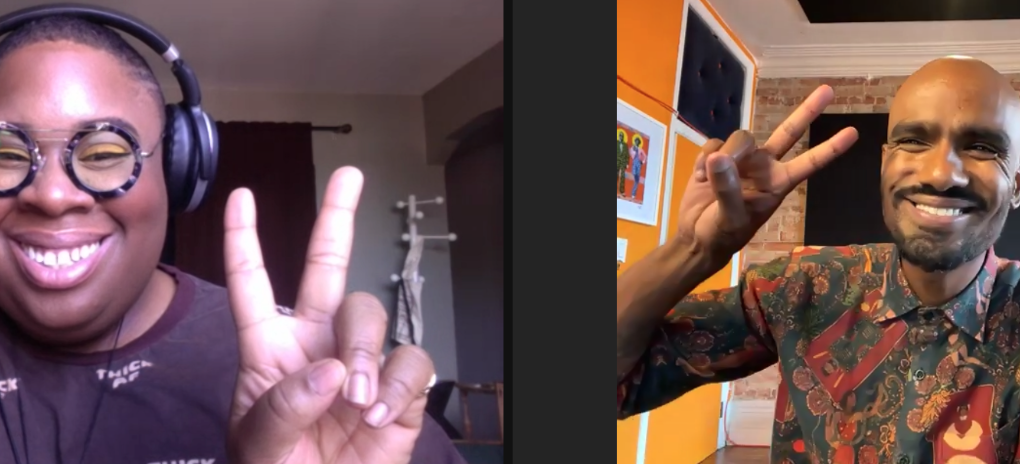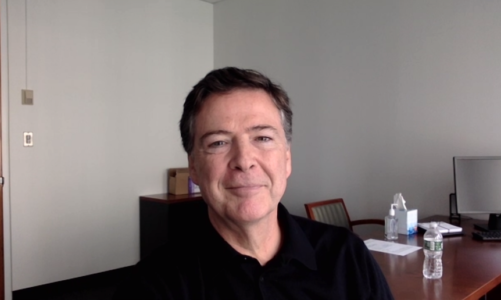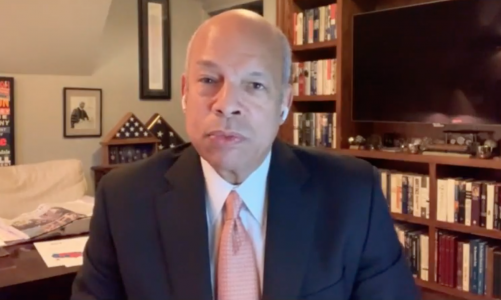
In August of 2021, TiKA and Shan Vincent De Paul teamed up to release their collaborative single “Hard Times.” Featuring extravagant fashion, dance numbers, and an otherworldly setting, the song quickly garnered attention leading up to both artists’ recently released solo albums. De Paul has seen press from the likes of GQ and Forbes while garnering over two million listens and international appreciation on his multi-lingual track “Neeye Oli,” the theme song for the Tamil film Sarpatta Parambarai. TiKA has also received coverage from major music publications such as The Fader and Xtra Magazine along with tens of thousands of listens on her heartbreaking yet uplifting 2021 album Anywhere but Here. Both artists sat down with Brown Interviews to discuss fantasy worlds, controversy, and their admiration for each other.
Evan Stein: I had a tough time writing questions for this interview. On one hand, I want to honor your stories and your cultural backgrounds that help make you two unique but on the other, I don’t want to tokenize you and put you in a separate category from other musicians because of where you’re from or what you talk about. From what I’ve gathered you both walk a similar line as artists. For you, Shan, someone who has songs like “Savage” that very blatantly point to the pain of your people but also as someone who makes a clear and present effort to show the world that “there is more to your people than just your suffering.” For you TiKA, you have songs for letting your hair down as well as deep, dark songs about struggle and heartbreak. How do you both walk the line art presents as a form of escapism vs. a form of expression?
TiKA: That is a great question. Back in the day if I had trauma, I would have to get to the place where I was able to discuss it before I could sing it. So maybe back then it was a form of escape. Now, I’ve kind of realized I can manifest the things that I want. Music is one of the highest forms of manifestation. I’ve become a lot more intentional with talking less about my past and my experiences and more about what I want to bring into my life. It got to the point where I was performing some of these heartbreak records and re-manifesting the experience. That’s a very real thing. I said to my manager the other day, “So next album round, I’m going to go to therapy.” All laugh.
S: Can you finish the album before you go to therapy, please? We need the heartbroken juices flowing.
T: Those juices are what I have to deal with though. When touring, it gets exhausting to constantly have to relive those experiences and having to pay homage to those people that don’t deserve it. Shan knows, we do art by way of practice but at what point does that way of practice start conflicting with your way of life?
S: When I first heard your record, TiKA, I thought, “There is no way anyone could have written this record without years of experience.” It is not a frivolous record. There is no frivolous line in it. You can feel the gravity of what you went through. That’s what makes it such a powerful record.
Going back to the question, for me it’s always an expression because escapism would imply a division in which I’m trying to leave one part and go to another. I live more in my art than I do the real world so it’s never trying to escape anything. I’m constantly trying to express the world I live in.
The thing is, if I chose to not make songs that are political, that is political by nature of who I am and where I come from. No matter what we do, as Black and Brown artists, it is inherently politicized. For me, it is more about expression. Art is just an extension of my world already.
TiKA, I was reading an interview you did with XTRA Magazine in which you talk about how making your music has been like a coming of age story for you. Both of your stories really do feel like coming-of-age movies. In your world of sci-fi universes crafted into music videos, blockbuster coming of age stories, and extravagant fashion, what role does every day, grounded reality play in your art?
T: Wow. Damn. I think I’ve gone through a transitory period in terms of songwriting and my decisions. When I started writing, I could only write from a narrative perspective because the trauma was too painful for me to address in the first person. I have a lot of songs that are words of encouragement like “Get Up” or “All Day All Night” that were directed at me. It wasn’t until [I wrote] Anywhere but Here that that all changed. That album is all me. My own lived reality was always part of my music, but the way in which I used to write didn’t let me live in the painful memory I was trying to express. I was removed from it. That is all my lived experience. If you go back to my first EP, Carry On, that was still me going through a depression but expressing it in a way that was almost empowering. I never want to be glamorizing my depression but as someone who comes from a background of spirituality, that empowerment was important. “Anywhere but Here” has been my lived reality. Life is what you make it and at times it can be shit. Now I’m realizing I’m in control of that. That’s been an awakening for me. I’m very grounded now and I’m able to be a lot more intentional with my art.
S: A lot. I mean a song like “Savage” was just me furious about something I saw in the media one day. I think the universes we create just represent where we are mentally. That’s always where I am and I’m just waiting for the world to catch up. That is my reality. My physical body is stuck on earth but my mind creates another world that then gets expressed in my art. That was the magic of “Hard Times” for me. This is the world I live in already and it may be tough to fathom what that is for a lot of people but for me and TiKA it was so seamless. The combination of energy was so effortless for us because we lived it. The emotion could come from the everyday world but the worlds we create are really just where I am mentally already.
It feels like you guys are coming from very different places with this. How did you two meet in the middle for “Hard Times?”
S: TiKA, you mentioned your song “Get Up.” That might have been the song that sparked our friendship. You sent me that song and told me the story. I just remember how jealous I felt. There’s two types of jealousy. There’s one type of jealousy that involves resentment and there’s the type of jealousy that fuels inspiration. I wish I wrote that song! It’s so good! I think for hard times, it was just so natural. We did it at La+ch’s place (the producer of the song). I had the chorus for years and sent it to TiKA. Sometimes, as an artist, you can have a great idea but you are not the right messenger to get that idea across. I remember when TiKA first delivered that chorus I was blown away.
T: You can actually hear him saying that on the track.
S: The track ends with me being like, “Oh my god!” I felt an intense spiritual connection with something higher than what was going on in that room. I was so inspired.
T: I love that. Thank you so much. Shan and I have an affinity for each other’s artistic processes. I am a fan of Shan’s work and once he releases his album, you’re going to hear some of the most incredible songs. His ability to convey storytelling through rap and hip-hop is so brilliant. Outside of the fact that you are a Brown man doing hip-hop, you’re so fucking good at it.
S: Thank you! The other reason we might’ve connected so well is because we both found our audience later in our lives than you would’ve expected: in our mid-thirties. Rather than attributing my success to certain moments of my career, we’ve both kind of realized this whole process is proof that we’ve made it. I get to wake up every day and do art. I made it. We both stuck it out until the blessings started to come and I think that was another place that we connected.
In your interview with Forbes, Shan, you mention, “Create a conversation that’s bigger than the art or the artist.” Where is the line with this? What separates a controversial video like “Savage” from the ever-so-controversial Logan Paul videos that put him on the map?
S: I guess the question is, “What’s the difference between creating a healthy conversation and a marketing scheme?” On the internet that line is blurred. That is still something I’m learning and navigating myself. I think people can smell authenticity. I will never take someone else down for what they’ve accomplished but most of the discussion those characters create is in an attempt to sell their boxing match and further their brand. The conversations I strive to create are deeper conversations about culture, appreciation vs. appropriation, etc. I’m talking about healthy conversations that are meant to unify us. Sometimes we need to express how different we are so that we can come together. People are very protective of their culture, and understandably so, but without healthy conversation and dialogue, it will be very difficult for us to come together. If I, as the artist and the initiator of the discussion, am left out of the conversation, I am okay with that. If I can create a piece of art that generates a larger, genuine, and healthy conversation then I am winning.
T: Everything that I do is political. It’s not purposeful or intentional. It just is what it is. Being a Black, queer woman is political already. I don’t think I have to force or sell a narrative or a story. I have enough going on already!
S: TiKA, do you ever find frustration in that? Say if you just want to release a really good love song, do you find it difficult to want to be removed and appreciated as just a voice or do you like the higher purpose that you are forced to serve?
T: I used to want [to be appreciated as just a voice] but I don’t so much anymore. I think I was like that when I had less lived experience. I used to like songs that lacked depth. I didn’t like Nina Simone for a long time but it wasn’t until I found depth that I found Nina. I used to just want to be a great love-song singer. I, now, like the fact that I come with so many layers and can still cultivate timelessness.
You both exist in circles that I believe are capable of healthy discourse in a way that characters like Logan Paul are not. Are you both happy with the conversations being had around your music?
T: I would say so. I’m pretty conscious of who my fans are. I read and pay attention to what’s going on. I think my music has evoked a lot of nuanced conversations that not even I was ready for. I appreciate that. Similarly to Shan, we both welcome open dialogue and communicative discourse. I live for that.
S: Within the last three days I’ve been brought into another international discussion. What I’ve realized is you don’t necessarily have control over how or where the conversation takes place around your art. Everybody on the internet has an opinion and wants to express it. Say someone who has millions of followers has something to say about me. Because I am not part of that in-group, it’s hard to navigate. Us artists don’t really get to choose where or how these discussions take place even when we initiate them.
Do you guys read the comments and reviews of your music?
T: I read everything. I care about that stuff. I love to see how people approach my art and what they were able to perceive. I’ve actually developed some really long term, long lasting relationships with some of those people. I don’t usually write [in the review style] but years ago, I ran a blog so I’m always curious about who is writing now. I live for that.
S: I think a great writer is just as rare as a great artist. I think when a writer is able to deconstruct art critically in a way I had never seen, it’s incredible. People derive meanings from my art that make more sense and are more meaningful than my intentions!
Shan, in an interview with Lifestyle Asia, you said you wanted to write an “anti-hit.” With the rise of TikTok, artists have been relying more and more on getting a catchy, quotable lyric that is susceptible to becoming a trend. As two artists who spend so much time and energy putting together sci-fi universes within your videos, do you run parallel to the mainstream or away from it?
S: I always try to stay connected. I think longevity for artists comes from how well connected you are. The youth are never wrong. Culturally, that is just how we evolve. They synthesize all the information that came before them and create something new. A lot of people criticize TikTok saying people are wasting their time. Those kids are being incredibly creative and spending their time making something!
An anti-hit is relative to where the culture is. If the culture is making bubblegum pop, that’s when you’re going to get someone like Tyler the Creator who debuted making something totally different. He stood out. If the culture is everyone making dark music then the anti-hit will be someone who makes a disco song. I am aware of the current but I am always trying to go against it.
T: That’s a good question. I think I’m the same. I am not a TikToker but I’m about it. I am not ageist in the slightest. The kids know what’s up! But personally, I don’t chase trends. I don’t chase anything really. I just attract what needs to come to me. I like to create timeless classics that will exist past when I am-
S: Which you did! Claps.
T: Aw. Thank you, Shan. I love you so much. When people find it, they find it and I’m okay with that. When I am working or collaborating with someone who does work on that frequency, I am not against it. Being an artist is being unafraid to step into someone else’s world. I don’t lose myself when I do that.
You both impress me so much, being people who are so well rounded and do so much beyond music. Which fits your style more: being able to jump from medium to medium like a Donald Glover or creating a whole multi-medium universe like Kanye?
S: I think mine is the latter. My goal is world building. When people listen to the album, the videos matter just as much as anything else. The fashion choices matter as much as most of the lyrics. I definitely would consider myself a world builder before I would [consider myself] a musician. Sometimes I have a visual concept before I have a song and I just have to wait for those two things to come together.
Can you imagine outsourcing from someone else or do you prefer creative control within your world?
T: Before, I was definitely a Donald Glover [type]. I am still a bit of that now but Shan is really inspiring me to be more of a world builder. I am very humbled. Shan is very clear and intentional in terms of his success, where he wants to be, and how he wants to be perceived. He is very clear and clairvoyant about most things. I have always done a plethora of different things. That’s the beauty of a community like the one I grew up with. You help where you can but now I am trying to help in a way in which I receive reciprocal exchange in a way that is less giving of myself. Being uncompromising of who I am is important to me now. I am more of a world builder now but I have always been one of variety.
S: For sure. Just before we hopped on this call, TiKa and I were just praising our friends Kyle Gervacy and Zola Zee, the stylists for the “Hard Times” video. They were the seed that created this world. We saw his style and were pulled into it. His style is so diverse-
T: And distinct!
S: So distinct. It fuses African fashion, Asian Fashion, Caribbean Fashion, and so much more. That’s our Toronto! That’s the world we know and Kyle and Zee were the seed of that. In that sense, I entered their world and it informed how to better build my world. They really were the architects of that world.
T: I don’t think the song would’ve been as magical as it was if it didn’t have that beautiful fashion in it. The ideas and the concepts behind it really made for a very progressive and forward thinking video. Timeless. But back to your question.
Do you guys have any shoutouts, final words, or things you want to tell us before we wrap this up?
S: TiKA’s got the best album of the decade out. I’ve got my album, Made In Jaffna, out now. Shoutout to Kyle. Shoutout to Zee. Shoutout to La+ch who produced “Hard Times.” I’m just excited for both of us.
T: That’s good for me. Shoutout to Kyle and shoutout to Zee. Oh! And shoutout to Shan’s new video that just dropped.
*This interview has been edited for length and clarity.




